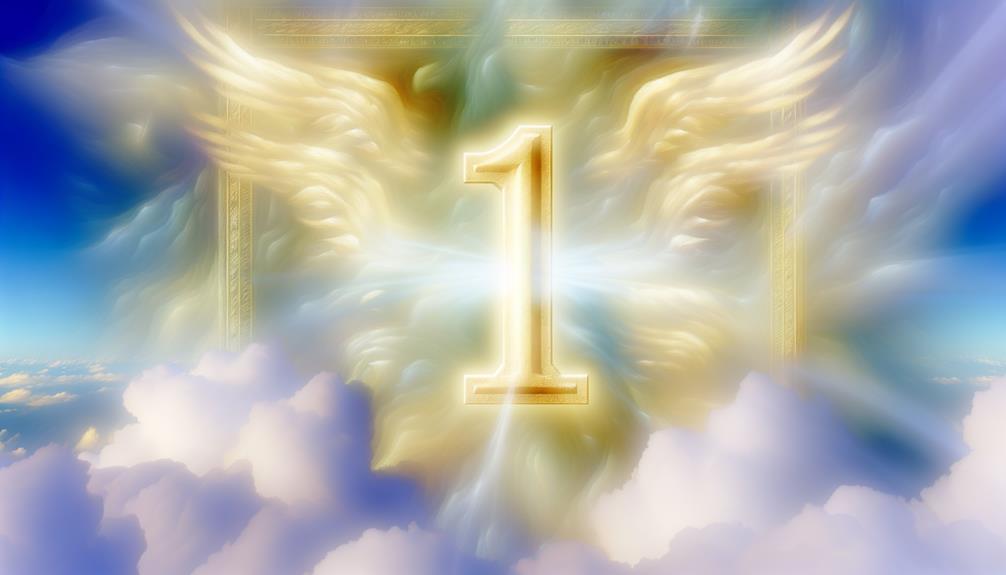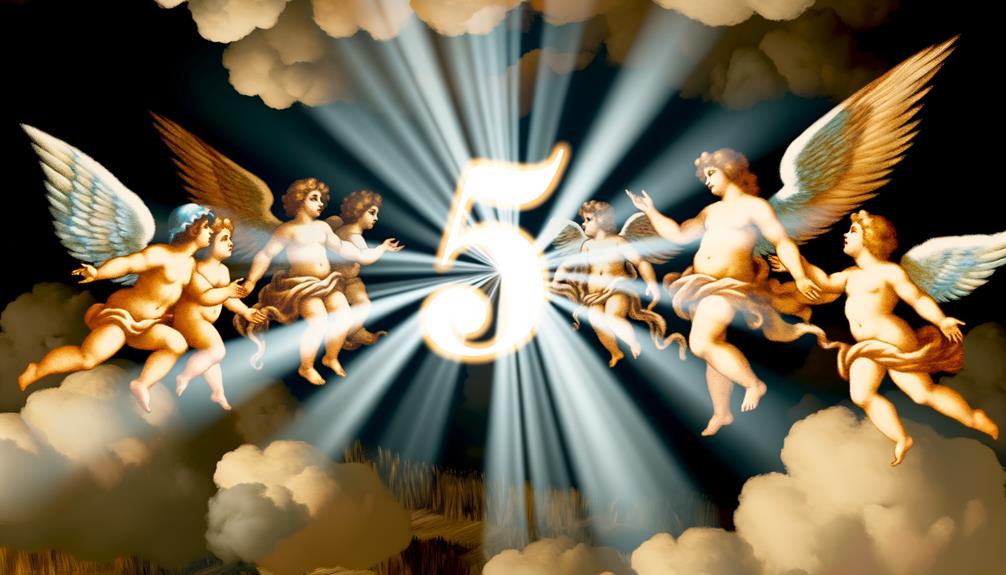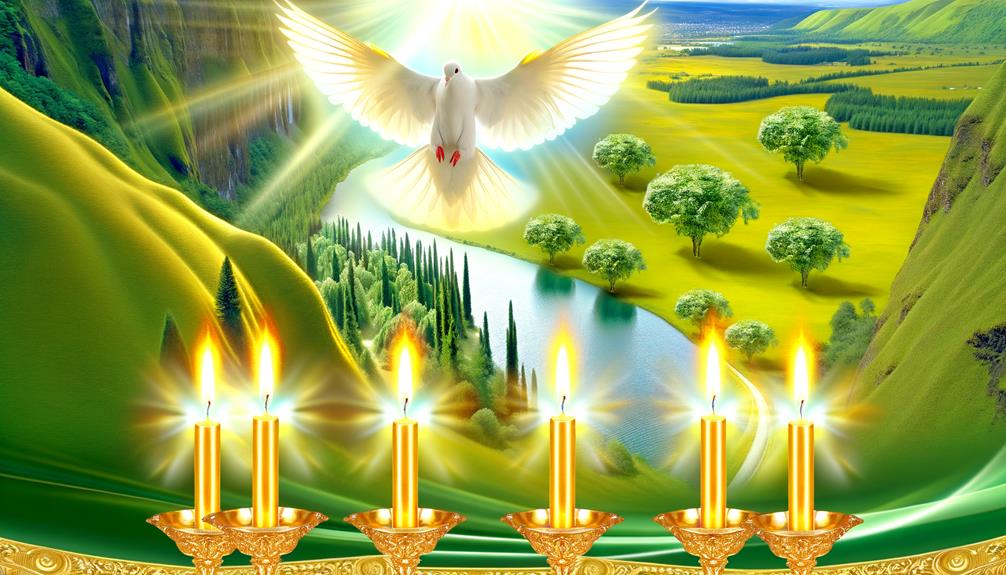Meaning of Numbers 1 9 in the Bible: Symbolism, Significance
The biblical numerology of numbers 1 to 9 reveals deep symbolic meanings drawn from scriptures and historical context. Number 1 represents the singularity of God (Deut.
6:4), while 2 symbolizes duality and witness (Deut. 19:15).
Number 3 signifies divine perfection such as the Trinity (Luke 24:7) and 4 denotes creation and earth (Gen. 1:14-19).
Grace is depicted by 5 (Lev. 1-7), human frailty by 6 (Rev.
13:18), and completeness by 7 (Gen. 2:2-3).
Number 8 stands for new beginnings (Mark 16:9) and 9 for finality and judgment (Gal. 5:22-23).
For further insights into these profound meanings, continue exploring.

Meaning of Numbers 1-9 in the Bible: Symbolism of Unity, Perfection, and Spiritual Completeness
| Number | Biblical Meaning |
|---|---|
| 1 | Unity & God’s Oneness — Represents the singularity and supremacy of God. It signifies unity, beginnings, and the oneness of God (Deuteronomy 6:4). |
| 2 | Witness & Partnership — Symbolizes duality, agreement, and testimony. The Bible emphasizes the need for two witnesses to establish truth (Matthew 18:20). |
| 3 | Divine Completeness & Perfection — Represents the Holy Trinity (Father, Son, Holy Spirit). It also signifies completeness and resurrection, as Jesus rose on the third day (Matthew 28:19). |
| 4 | Creation & Universality — Associated with the four corners of the Earth, four seasons, and elements. It signifies God’s creation and completeness in the physical world (Revelation 7:1). |
| 5 | Grace & Favor — Represents God’s grace, kindness, and favor toward humanity. The five offerings in the Old Testament symbolize God’s grace (Ephesians 2:8-9). |
| 6 | Imperfection & Humanity — Associated with man, as humanity was created on the sixth day. It symbolizes imperfection and human weakness, falling short of divine completeness (Revelation 13:18). |
| 7 | Spiritual Perfection & Completion — Represents God’s perfect work, seen in the seven days of creation. It symbolizes completeness and spiritual fulfillment (Genesis 2:2-3). |
| 8 | New Beginnings & Renewal — Signifies new beginnings, resurrection, and regeneration. The eighth day represents a new start after a period of rest or completion (2 Corinthians 5:17). |
| 9 | Divine Completeness & Judgment — Represents spiritual maturity, finality, and the fruits of the Spirit. It often signifies divine judgment and the conclusion of a matter (Galatians 5:22-23). |
Number 1: Unity and God

In biblical numerology, the number one is often associated with the unity and singularity of God, as emphasized in scriptures such as Deuteronomy 6:4, which declares, ‘Hear, O Israel: The Lord our God, the Lord is one.’
This verse, known as the Shema, underscores the monotheistic foundation of Jewish faith, centralizing the concept of one God. Historically, this assertion was essential in distinguishing the Israelites from surrounding polytheistic cultures.
The number one symbolizes God’s indivisibility and ultimate authority. Additionally, in the New Testament, Jesus reiterates this unity in John 10:30, stating, ‘I and the Father are one,’ thereby reinforcing the theological continuity.
Consequently, the number one epitomizes divine singularity and supremacy throughout biblical texts.
Number 2: Duality and Witness

The number two in biblical numerology frequently represents duality and the concept of witness, as illustrated in the scriptural mandate found in Deuteronomy 19:15, which states, ‘A matter must be established by the testimony of two or three witnesses.’ This principle underscores the importance of corroboration in establishing truth.
In Genesis, the duality of creation is evident with the formation of male and female (Genesis 1:27). Additionally, the two tablets of the Ten Commandments signify the covenant between God and His people (Exodus 31:18).
Historically, the Bible often employs pairs to convey completeness and the necessity of partnership, such as Moses and Aaron or the two cherubim on the Ark of the Covenant (Exodus 25:22).
Number 3: Divine Perfection

Frequently, the number three in biblical numerology symbolizes divine perfection and completeness, as evidenced by the Holy Trinity: Father, Son, and Holy Spirit (Matthew 28:19). This triune nature of God epitomizes ultimate unity and perfection.
In historical context, the number three often signifies wholeness and divine fullness. For example, Jesus resurrected on the third day (Luke 24:7), underscoring triumph over death and the completeness of His mission.
Additionally, three patriarchs—Abraham, Isaac, and Jacob—form the foundational lineage of the Israelite nation.
The Apostle Paul, in 2 Corinthians 13:14, blesses the congregation with the grace of Jesus, love of God, and fellowship of the Holy Spirit, further emphasizing the divine perfection encapsulated by the number three in biblical teachings.
Number 4: Creation and Earth

The number 4 holds significant biblical symbolism, often representing creation and the earth.
Scripturally, this is highlighted by the four elements—earth, air, fire, and water—echoing the material world’s completeness, as well as the four directions—north, south, east, and west—emphasizing the entirety of the earth’s expanse.
Additionally, the Bible recounts the creation of the material world within four days (Genesis 1:14-19), underscoring the number’s intrinsic link to the physical domain.
Four Elements Symbolism
Interpreting the number 4 within biblical texts reveals its profound association with the creation and the earthly sphere, as evidenced by scriptural references and historical exegesis.
The number 4 frequently symbolizes the four elements of creation: earth, air, fire, and water. This elemental symbolism underscores the completeness and totality of the material world in biblical literature.
For instance, Ezekiel 1:5-10 describes four living creatures, each with four faces, representing various aspects of creation. Historically, theologians such as Augustine have linked these elements to the natural order established by God.
The four cardinal directions—north, south, east, and west—further signify the number’s encompassing nature, anchoring it firmly within the physical domain as a representation of God’s creative authority.
Biblical Creation Days
Embedded within the biblical narrative, the fourth day of creation in Genesis 1:14-19 epitomizes the divine orchestration of celestial bodies to govern day and night, marking time and seasons, thereby establishing the foundational structure of the earthly domain.
This scriptural passage details the creation of the sun, moon, and stars, which not only illuminate but also serve as signs for sacred times.
Historically, this aligns with ancient Near Eastern cosmology, where celestial bodies were integral to agricultural cycles and religious observances.
Theologically, these luminaries reflect God’s sovereignty and meticulous order in creation, underscoring the importance of temporal rhythms in human life.
These rhythms continue to be honored in Judeo-Christian traditions through liturgical calendars and seasonal festivals.
Earthly Directions Significance
Building upon the divine orchestration of celestial bodies, the number four in biblical numerology often symbolizes the earthly domain and its foundational elements, as seen in the four cardinal directions—north, south, east, and west—highlighting the all-encompassing nature of God’s creation.
Scripturally, this significance is evident in passages such as Isaiah 11:12, which speaks of gathering the dispersed from the four corners of the earth.
Historically, the number four also aligns with the four seasons, further emphasizing God’s mastery over time and nature.
Additionally, in Ezekiel 1:5-6, the prophet’s vision of four living creatures represents the fullness of divine presence on earth.
Consequently, the number four underscores the completeness and order inherent in God’s earthly creation.
Number 5: Grace and Favor

The number 5 in the Bible is frequently associated with the concepts of grace and favor, as evidenced by numerous scriptural references and the symbolic use of this number throughout biblical history.
In Genesis, God’s grace is exemplified in the five offerings (Leviticus 1-5), symbolizing His favor toward humanity.
The tabernacle, a significant symbol of divine presence, used multiples of five in its construction, such as five curtains and pillars (Exodus 26).
David’s choice of five smooth stones (1 Samuel 17:40) to defeat Goliath signifies divine favor in overcoming adversity.
Additionally, the New Covenant recounts the feeding of the 5,000 with five loaves (Matthew 14:17), underscoring God’s abundant grace.
Consequently, the number 5 consistently represents divine generosity and benevolence.
Number 6: Human Weakness

Often regarded as a symbol of human weakness and imperfection, the number 6 in the Bible frequently illustrates mankind’s inherent flaws and limitations, as demonstrated by its scriptural associations and historical context.
In Genesis 1, humanity was created on the sixth day, emphasizing human dependency on God’s subsequent provision and grace. Additionally, the number 666, cited in Revelation 13:18, epitomizes ultimate imperfection and fallibility, representing the antithesis of divine perfection.
The six days of labor mandated in Exodus 20:9 further underscore human toil and the necessity for rest. Throughout biblical texts, the number 6 underscores human vulnerability and the continuous need for divine intervention and support, highlighting the gap between human effort and divine completeness.
Number 7: Completeness and Rest

The number 7 is intricately woven into the fabric of biblical narrative, symbolizing completeness and divine rest as epitomized in Genesis 2:2-3, where God ceases His creative work on the seventh day.
This concept of rest permeates Scripture, extending to the seventh-year Sabbath for the land in Leviticus 25:4, underscoring a cyclical pattern of work and repose.
In addition, the number 7 frequently appears in prophetic literature, such as in the seven seals, trumpets, and bowls in the Book of Revelation, signifying spiritual perfection and the fulfillment of God’s ultimate plan.
Creation and Sabbath Day
In biblical literature, the number seven frequently symbolizes completeness and divine perfection, particularly exemplified in the creation narrative and the institution of the Sabbath Day.
Genesis 1:1-2:3 recounts God’s creation of the world in six days, culminating in the seventh day when He rested, declaring His work complete. This act established the Sabbath, a day of rest and sanctification, as detailed in Exodus 20:8-11.
Historically, the Sabbath has been integral to Jewish and Christian practices, symbolizing not just physical rest but spiritual renewal and alignment with divine order.
Consequently, the number seven holds profound theological significance, representing a cycle of creation and rest that underscores the completeness and perfection of God’s work.
Symbolism in Scripture
Building upon the theological significance of the Sabbath, the number seven in biblical scripture is consistently portrayed as a symbol of completeness and divine perfection, reflecting God’s ultimate authority and the harmonious order of creation.
Genesis 2:2-3 recounts that God rested on the seventh day after completing His work, establishing a pattern of rest and worship.
Leviticus 23:3 reinforces this, designating the seventh day as a Sabbath of solemn rest.
Additionally, the Book of Revelation (1:20; 5:1) uses seven extensively, symbolizing divine completeness and eschatological fulfillment.
Historically, the number seven held profound importance in ancient Near Eastern cultures, but its biblical connotation uniquely underscores God’s covenantal relationship with humanity, epitomizing spiritual wholeness and divine rest.
Spiritual Perfection Significance
Recognized as a symbol of divine completeness and rest, the number seven in the Bible encapsulates the spiritual perfection that stems from God’s orderly creation and covenantal promises.
This is first evidenced in Genesis 2:2-3, where God rested on the seventh day, sanctifying it. The Sabbath, observed on the seventh day, further emphasizes this concept of rest and holiness (Exodus 20:8-11).
The prominence of seven extends to the sevenfold structure of the Book of Revelation, illustrating completeness in divine judgment and fulfillment (Revelation 1:4, 5:1).
Historically, seven appears in various significant contexts, such as the seven branches of the menorah in the Tabernacle (Exodus 25:31-40), symbolizing divine light and guidance.
This confluence of scriptural references underscores the number’s profound theological resonance.
Number 8: New Beginnings

The number 8 in biblical numerology is often associated with new beginnings and regeneration, as evidenced by significant scriptural events and patterns.
After the seven days of creation, the eighth day symbolizes the start of a new order (Genesis 2:2).
Circumcision, a sign of covenant, occurs on the eighth day (Leviticus 12:3), marking a new phase for the male child.
The resurrection of Jesus, occurring on the first day of the week, can also be seen as an eighth day, heralding a new covenant and the rebirth of mankind (Mark 16:9).
Additionally, Noah was the eighth person to step onto the new earth post-flood, representing a fresh start for humanity (2 Peter 2:5).
These instances underscore eight as a number of renewal and fresh beginnings.
Number 9: Finality and Judgment

Frequently associated with notions of finality and judgment, the number 9 in biblical numerology often signifies the culmination of a cycle and the ushering in of divine judgment, as evidenced by scriptural references and historical contexts.
For instance, in Galatians 5:22-23, the fruit of the Spirit encompasses nine attributes, symbolizing the completeness of divine character.
Additionally, the Day of Atonement, Yom Kippur, which is the holiest day in the Jewish calendar, occurs on the 9th day of the 7th month, underscoring themes of repentance and judgment.
Moreover, in Revelation 9, the nine judgments herald the finality of God’s plan.
Consequently, the number 9 encapsulates both the end of an era and the beginning of divine reckoning.
Conclusion
The biblical numerology of numbers 1 through 9 reveals profound spiritual significance, each embodying unique divine principles. The biblical significance of Hebrew numerology is also seen in the use of numbers throughout the Bible, such as the significance of the number seven as a symbol of completeness and perfection. Each number holds a specific meaning and when combined with others, can reveal deeper spiritual truths. The study of biblical numerology and Hebrew numerology is a fascinating way to gain a deeper understanding of the divine principles and symbolism found in scripture.
From the unity and supremacy of God signified by number 1 to the conclusive judgment represented by number 9, these numbers offer a glimpse into the intricate design of biblical theology.
Enveloped in historical context and scriptural references, the meanings behind these numbers remain pivotal for understanding divine intentions.
The depth of their implications beckons further exploration and contemplation.






